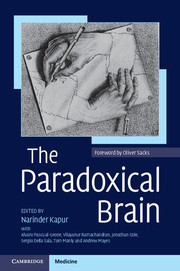Thomas Browne, physician and author, coined the term paradoxology, the use of paradoxes, in his Pseudotoxia Epidemica or, Enquiries into Very many Received Tenets, and commonly Presumed Truths. Now Narinder Kapur has assembled a crack team of eminent scientists and clinicians to use paradoxology to illuminate various facets of how we understand (but very often don’t understand) the brain today. In this extremely interesting and ambitious book, with a foreword from Oliver Sacks (surely the foremost exponent of popular neuroparadoxology), the experts candidly discuss counterintuitive phenomena observed while studying the brain. Most relate to patient groups and treatment effects, but there are also chapters on topics such as comparative cognition between different species (it is humbling to know that my visuospatial performance on certain tasks is likely to be worse than a well-trained chimp’s) and the nature of human expertise.
The book is refreshingly targeted at people who are interested in the brain regardless of particular career path or level of seniority, and I very much doubt that there is anyone who is well-versed with all of the paradoxes, from the creativity of those with psychiatric conditions to the relationship between allergies and gliomas, described here. Moreover, many of the chapter authors, who are leaders in their fields, seem to relish being able to be discursive without the need to be as forcefully directed as is sometimes necessary for a journal article or specialist review. In addition, most of them cite across the breadth of the topic, rather than concentrating on their own contributions. Personally, I found the chapters on paradoxes in Parkinson’s Disease (Ashwani Jha and Peter Brown) and Learning and Memory (Henry L Roediger, III and Andrew C Butler) especially interesting. A number of the authors begin with historical introductions to each subject and I particularly enjoyed the backgrounds in the chapters on ECT (Angela Merkl and Malek Bajbouj) and psychosurgery (Perminder Sachdev) showing us just how far we haven’t come.
One drawback to the book is the occasional feeling that it is trying too hard to contrive a paradox, where the underlying issue is one of biological complexity (‘non-linear’ effects etc) rather than apparent contradiction.
In the final chapter, ten ‘principles of brain function’ are proposed in order successfully and sensibly to disentangle the paradoxes of brain research. Whether or not the ten principles catch on remains to be seen but Professor Kapur and colleagues have succeeded in producing a book that will stimulate thought on phenomena encountered during the course of our neuroscientific work and in our daily lives, which is a great achievement. I would recommend it to anyone (presumably all the people reading this) genuinely interested in the workings of the brain and how we go about trying to understand them. Thomas Browne, whose own brain has been commemorated in stone in his hometown of Norwich, would have approved.

